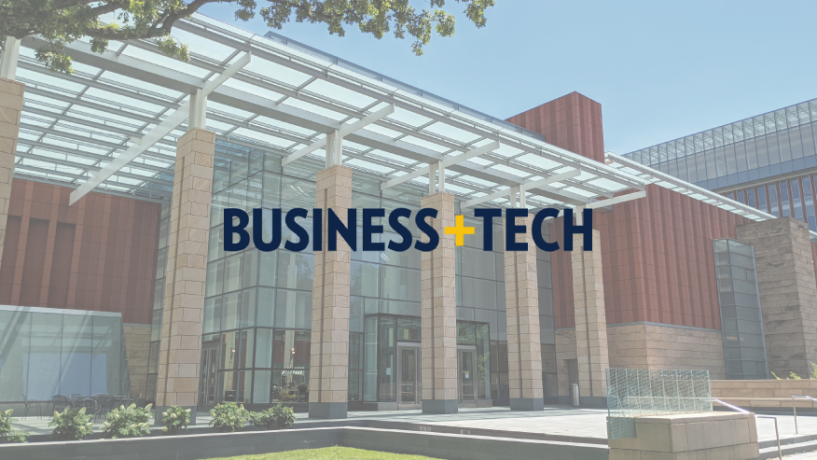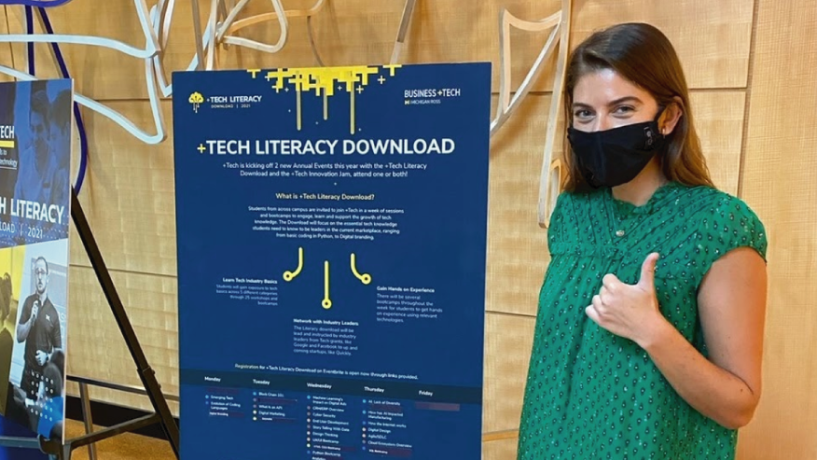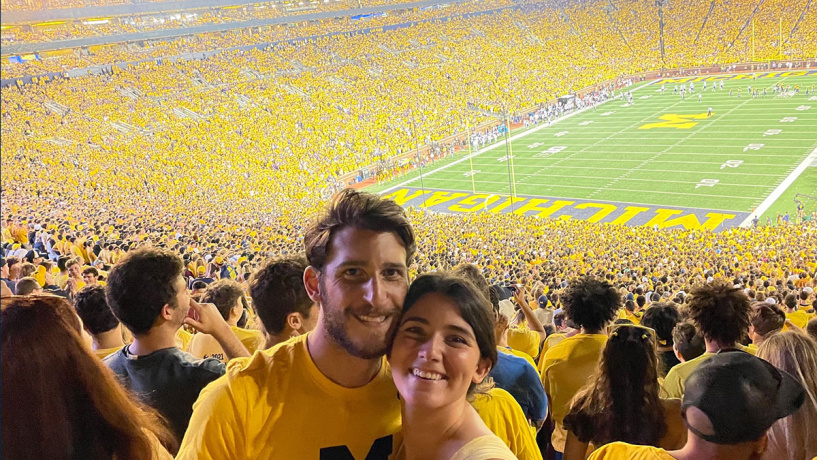Michigan Ross Students Among Winners of the Inaugural +Tech Innovation Jam
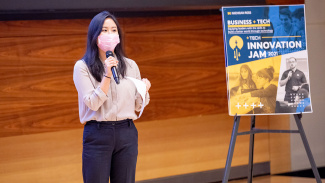
Over 200 students from the Ross School of Business and across the University of Michigan participated in the first +Tech Innovation Jam competition, which challenged 40 interdisciplinary teams to go from idea to working prototype ready to pitch in just five weeks.
Organized by Business+Tech at Michigan Ross, with support from U-M’s School of Information and Center for Entrepreneurship, the competition brings U-M students of diverse backgrounds and experiences into teams to tackle a timely prompt. Students are encouraged to leverage their individual expertise to develop a functional and innovative digital prototype that addresses the prompt.
This year’s prompt was to create an innovative digital product to help bring more connectivity into the world after a year of increased isolation due to the pandemic. In addition to a cash prize, the winning teams earned possible entry for their company into the Living Business Leadership Experience course at Michigan Ross, where students will take the team’s product into the classroom and continue to push the idea toward becoming a viable product with funding potential.
“The vision for the +Tech Innovation Jam was to bring together a diversity of thoughts, ideas, and skills from across campus to ideate, design, and build a prototype of their digital solution,” said Phil Brabbs, managing director of Business+Tech at Michigan Ross. “Beyond the competition, the program included workshops, office hours with faculty and tech leaders, and access to tons of resources to educate students on how to go from an idea to a solution — all with the goal of increasing tech literacy and competency for the hundreds of student participants.”
+Tech Innovation Jam winning teams

After pitching to an expert panel of judges, the team behind Oudio, an innovative social media platform that allows its users to share the “not so perfect” aspects of their lives via audio (micro-podcast) and anonymity options, was declared the winner. Members of Oudio — Didsayachai Prirungruang, MBA ’23; Jihee Yoon, MS ’23; Akhila Kosaraju, MA ’23; and Zelda Hu, MS ’23 — received a $5,000 check, along with the chance to participate in LBLE.
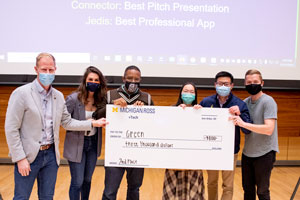
Second place went to Green, a gift giving platform that leverages AI and user data to help streamline the gift giving process. Green team members — Cory Cooney, MBA ’23; Devlin McConnell, MBA ’22; Jeremy Huang, MS ’23; and Karon Green, MS ’24’ and Xinyi Wang, MSI ’22 — earned a $3,000 prize.

Third place went to Hand In Hand, a volunteering platform with the goal of streamlining and consolidating the volunteering process to encourage and enable both prospective volunteers and organizations in need of volunteers. Hand In Hand team members — April Tsai, BA/BS ‘23, and Lily Wu, BS ‘23 — received a $2,000 prize.
“All the participants were great, and we were very impressed by the effort and ideas each team displayed,” said Brabbs.
An engaging action-based learning opportunity in tech innovation
The +Tech Innovation Jam proved to be a valuable opportunity for Michigan Ross and U-M students to gain hands-on experience at the intersection of entrepreneurship and tech.
“When I first read about the +Tech Innovation Jam, I couldn't wait to sign up,” said McConnell of Green team. “I love these types of case competitions because it provides a short, risk-free opportunity to take the lessons from class and apply it to a real-world scenario. One of my goals at Michigan Ross is to learn how to start my own business, and this was the perfect outlet to test out ideas and first steps to a launch.”
Fellow Green team member Cooney said the +Tech Innovation Jam provided an important introduction into working on a tech-related project. “I have had limited experience in tech prior to Ross, so for me, it sounded like a unique and fun opportunity to get outside of my comfort zone,” he said.
Given his interest in entrepreneurship, McConnell said the most enjoyable moment of the competition was the reveal of the novel product at the end.
“Turning a nebulous idea into a real prototype requires creative thinking, analytical judgement, market research, internal debate, and a little bit of wishful thinking,” he said. “After all the hard work is done, and the prototype is revealed, the feeling is sublime. Not only that, but each time the prototype was shown to focus groups, and you can see others' faces as they click through the app, that feeling gets repeated.”
Leveraging the diversity of backgrounds and experiences of team members
Beyond gaining experience in tech, Cooney said he was able to learn from his interdisciplinary teammates, which he also believes was key to their team’s success.
“My team was amazing: Throughout the five-week competition, I learned so much from all of them and am grateful for their time and willingness to help me grow my skills,” he said. “We leaned into our diverse backgrounds and realized we all had areas where we could lead and other areas where we could learn. This made for a very collaborative environment where everyone was comfortable being themselves.”
McConnell also said their team’s success was founded in team culture.
“While everyone on the team came from very diverses backgrounds and had a wide range of specialties and strengths, we all had the same initial goal for signing up: We were there to build something ‘really cool.’ That desire — to build something we were proud of — manifested itself through a strong work-ethic and through a selfless, team-first attitude,” he said.
A unique competition on campus
Both Ross MBA students said bringing together students from across campus in teams that were chosen for them makes the +Tech Innovation Jam stand out from other programs on campus and added to its success.
“It led to some amazing ideas from all the teams that may have never come to fruition if we were siloed by school,” said Cooney.
Moreover, McConnell said another main motivation behind him competing was as another opportunity to engage with students from other schools at U-M after joining Sling Health, an incubator program that connects biomedical-focused students from different schools across campus, last year.
“I partnered with medical, mechanical engineering, and biomedical students to build a healthcare device, which has been my favorite venture that I've done while at school,” he said. “The opportunity to do another co-curricular activity with students across the university was a no-brainer.”
Despite his experience in other competitions on campus, McConnell said having teams chosen for them added another layer to the challenge’s complexity and enhanced the learning experience.
“I think it made it very interesting because it leveled the playing field,” he said. “It seemed the first two weeks of the five-week sprint were dedicated to building trust within the team and aligning on the idea we were going to move forward with. I think the team building aspect was a positive aspect, but definitely another hurdle we had to overcome.”
I may be biased, but I thought this was a fantastic experience.





